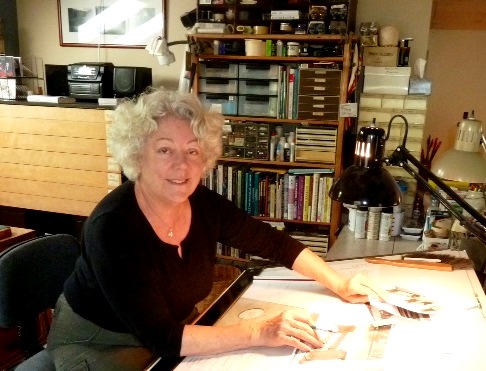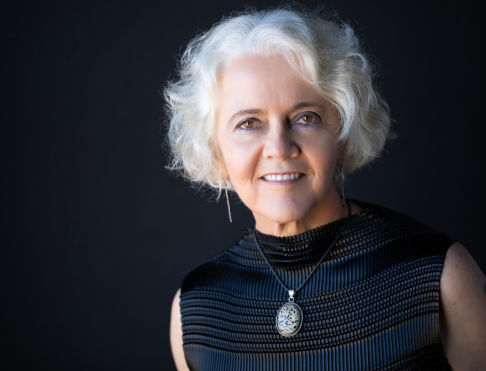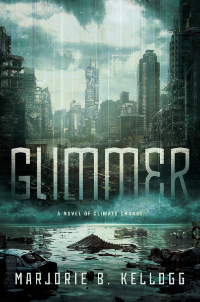Sensual Storytelling
Donna Glee Williams, author of fantasy novel The Night Field, talks to Marjorie B. Kellogg, author of the science fiction dystopia Glimmer.


DONNA GLEE: Hi, Marjorie—
When I read a book, questions always bubble up that I wish I could ask the author. I’m delighted that our Climate Fiction Writers pairing gives me a chance to ask you about your impressive 2021 near-future dystopia Glimmer (DAW, 2021). In the novel, you go to considerable pains to explore the physical, social, and psychological realities of a world reshaped by cataclysmic climate change. Why do you think it’s important to commit this act of imagination and to show that world to your readers?
MARJORIE: Hello, Donna Glee—
Wonderful to have the chance to talk with you about our books! As for world-building, I have always been drawn to expressions of the senses, to color and texture, smell and sound. And because, as living beings, we share the sensual experience, this seems to offer a compelling common language for storytelling. Even when writing in the fantasy genre, these have been my touchstones, with the aim of making the world of the book as alive and immediate, and therefore, as convincing, to the reader as possible.
And ‘convincing’ matters when it comes to climate fiction because I feel people have distanced the whole subject of climate change because it’s too big and in many ways too abstract for them to come to grips with, to find their personal relationship with, even though it’s going to impact them on a daily basis. Turning your eyes away from something generally leads to ignorance and inaction. So, in Glimmer, my goal was to imagine the reality of climate change, to bring it right home, by evoking a place that is familiar (a New York City that could be any city) but changed by circumstances not too hard for the reader to put themselves in. If they can feel that place wrapping its sensual realities around them as they read, surely they can better grasp the truths of climate change as it will affect their own, very personal future.
Read the full conversation at the Climate Fiction Writers League on Substack.

An Interview with Writer Marjorie B. Kellogg
Glimmer is a compelling character, who’s driven by survival and a sense of loss. Please tell us where she comes from! Who or what inspired her?
Basically, a who AND a what. The ‘what’ was a technical need: writing about a time that hasn’t happened (quite) yet requires a good deal of backstory and world-building, so that the reader can settle into an unfamiliar future with confidence, not constantly having to ask, “What’s going on and where am I?” But exposition can be static, badly disrupting the narrative flow. I wanted the characters to provide the necessary information through action and dialogue. Thus, Glimmer’s memory loss: if my protagonist can’t remember how the world got to the way it is as the story begins, the people around her must fill in by remembering it for her, gradually and as needed.
Later, as Glimmer regains her past bit by bit, her recollections become much more personal, but by then we have learned the world well enough to fit the personal into the more general Big Picture of flooded Manhattan 2110. But losing your past dislocates your sense of self as well as your place in the world. It leaves you vulnerable to missteps and misunderstandings, some perhaps comical but also potentially fatal. It’s a kind of disability.
Read the full interview at the Artists & Climate Change website.

The Big Idea: Marjorie B. Kellogg
As anyone who has ever written a near-future novel will tell you, the problem with that sub-genre is that “the future” keeps catching up with you in unexpected ways. Marjorie B. Kellogg can attest to that; while writing Glimmer, the world kept reminding her that the story she was creating was all too close to the one unfolding around us all.
Glimmer began not with a new Big Idea, but with what seems to me a tragically obvious one: climate change is upon us, and we are not going to fix it. Even if we could muster the global will to try, it’s likely too late to succeed. So how are we going to live with it?
Read more of Marjorie B. Kellogg’s thoughts on the process of writing Glimmer on John Scalzi’s Whatver blog.

Marjorie B. Kellogg: On Climate Fiction as Its Own Genre
Author Marjorie B. Kellogg discusses the decade-long process of writing her new science fiction/climate fiction novel, Glimmer.
When we talk about climate change, too often it’s in remote, scientific terms or on a scale too vast for most people to connect with on a personal level (never mind all the complicating politics). By offering an entertaining and compelling yarn, I’ve tried to put a down-to-earth, human face on the disruption, violence, and suffering that climate change will bring.